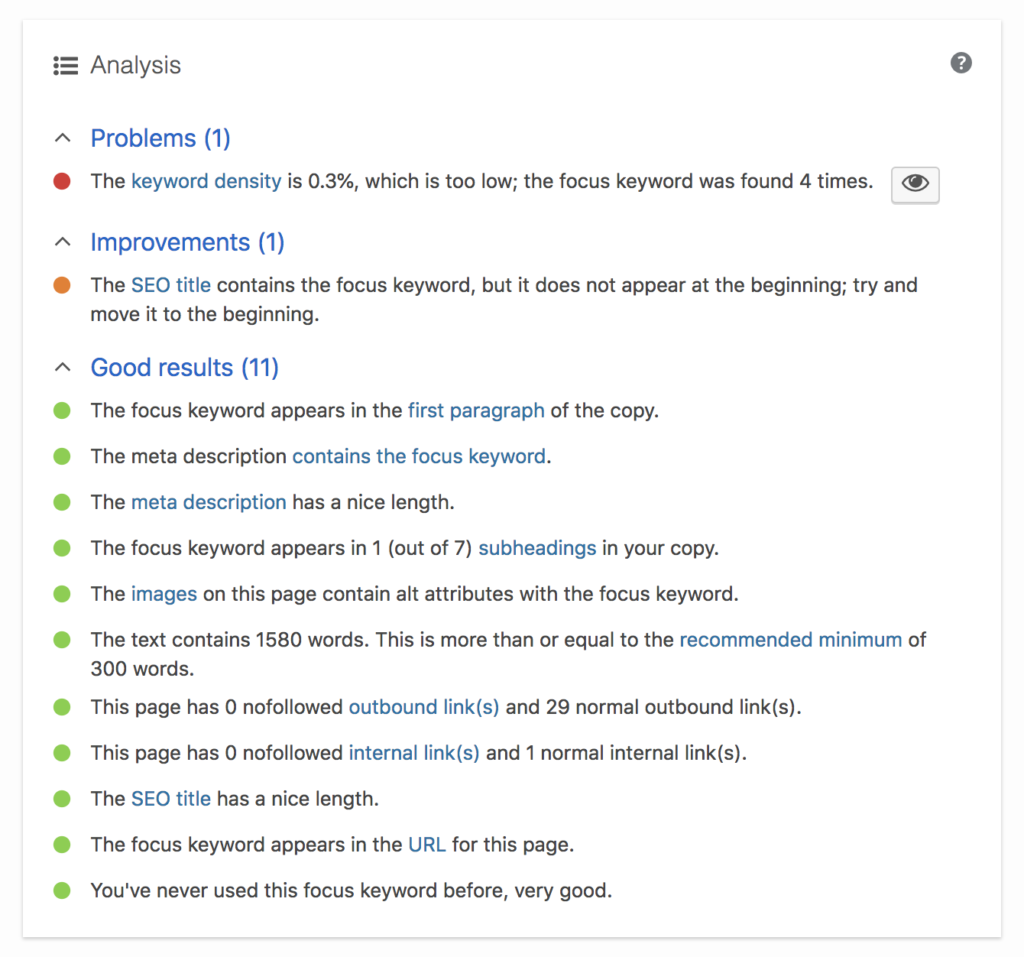There are dozens of organic content marketing mistakes you can make, especially if you’re managing content marketing yourself—but aren’t a marketer. I look at hundreds of websites each week, between researching for link building opportunities and writing articles, and even see large publishers and blogs making mistakes that can hurt your rankings, reduce social shares and much more.
Get the most for your time and money by avoiding these common organic content marketing mistakes.
Not Making Use of Expert Contributors
One of the biggest content marketing mistakes I see is not making use of expert contributors and guest authors. These outside writers bring credibility to your brand along with a new perspective. It can become challenging to come up with new angles and topics when you’re in it day-in and day-out. Working with guest authors and expert contributors allows you to tap into that fresh perspective.
Not all bloggers will bring that fresh perspective or credibility, however. That’s why it’s important to work with contributors who can speak authoritatively on the subject. If an HR expert wrote an article on how to perfect your form in the gym, the content isn’t credible—unless that HR expert is also a personal trainer.
This isn’t just important for the credibility of your brand, but can help or hurt your rankings as well. Authorship is becoming more and more important for Google, and they’re looking at three factors (E-A-T) when ranking your content in terms of authorship:
- Expertise
- Authority
- Trustworthiness
To find contributors that have E-A-T, look for the 3 P’s before accepting any pitches or submissions:
- Personal experience with the topic or industry
- Previously published work
- Personal website or blog
Finding the right contributors will also help expand your content reach. When published, these contributors are likely share the new post with their audience, and tag you. If they’re an authority in their industry, and relevant to your business, you’ll be exposed to an audience that wants to read more of what you have to offer. This drives traffic and new followers.
More: 5 Reasons Guest Posting is the Missing Piece
Not Using SEO Keywords
While keywords may not used the way they used to—keyword stuffing, exact match phrasing etc.—they’re still valuable in the world of organic SEO. Keywords make it easier for search engines to understand your content quickly and easily. While some people say that keywords are no longer a ranking factor, they do still play an important role in the success of your organic content marketing. For example:
- The title tag of each content piece is an important on-site SEO factor; this is an important location to place your keyword.
- Title tags that start with your keyword perform better than those with the keyword toward the end, according to Moz.
- H1 tags tell Google what content is the most important. Including keywords here shows search engines what the content is about, allowing you to rank higher for that term.
Ultimately, keywords are the the foundation of your content and the one of the main reasons why organic content marketing works. For example, you write a blog post about how to properly plant succulents with the keyword, “how to plant succulents.” This is a topic that’s important to potential customers who buy succulents like the ones you sell, so you want to rank for it.
Including that keyword in the title of the post, in an H1 within the text and toward the front of the title tag means you’re more likely to rank for that term. Even if you talk about a wide range of topics like choosing pots and picking out the right varieties.
For busy business owners and entrepreneurs, keywords also serve as a guide to make sure you’re staying on topic with your content. For example, some of the keywords I’ve built into my content include:
| Organic content marketing |
| Social media marketing |
| Social media strategies |
| Guest Posting |
| Instagram strategy |
| Content marketing strategy |
To make sure you’re getting SEO right, use the Yoast SEO plugin. It does all the work for you, and shows how you can boost the SEO of each post based on your keyword. See a screenshot below:

If you’re new to using keywords, avoid this organic content marketing mistake by learning more:
Google’s 200 Ranking Factors: The Complete List
Not Making Blog Posts Shareable
It blows my mind that some websites and blogs still don’t have social sharing buttons on their content. While this may seem like a small detail, think about this scenario:
Someone really loves your blog post. They want to quickly share it on Twitter, but they can’t find a share button. Now they have to:
-
- Open a new tab or window.
- Log into their Twitter account if they aren’t already logged in.
- Copy and paste the URL.
- Add text.
- Add your handle, which they now have to search for.
How likely is it that they’ll take ALL five steps to share this post? If they really like it, perhaps they’ll go through the trouble. However, considering consumers’ lack of attention span and need for convenience, chances are they’ll leave without doing it. Don’t take the chance of this happening when most sharing plugins are free and very easy to add to your site.
I recommend checking out the sharing plugin I use, SwiftyBar, along with two other social sharing plugins I really like: Sumo and ShareThis. Don’t forget to use JM Twitter Cards to make sure your links post like this on social media:
Drive targeted traffic for FREE? Yupp – you can use guest posting to do that! Find out how. https://t.co/KdCKyHMz2E #guestposting #linkbuilding
— Jessica Thiefels (@JThiefels) August 23, 2018
And NOT like this:
Love this idea! I’ve done something similar with executive quotes, so they’re easy to add into social posts and blog posts. #contentmarketing #contentcreators https://t.co/OWha37CTf2
— Jessica Thiefels (@JThiefels) August 23, 2018
Not Tapping Into ALL of Your Content Resources
Content is all around us, yet so many clients say to me, “I just don’t have anything to share” or “I don’t even know what to post.” Remember: content is more than just blog posts. To start tapping into all your content resources, broaden your definition of the term to include:
- Images
- Graphics
- Testimonials
- Blog posts
- Videos
- Articles
- Landing page text
Here are a few examples of missed content opportunities:
Screenshots from your website. You don’t need to design an entirely new graphic if it already looks good on your site. You also don’t need a high-res image for a simple social share. See an example of this below—screenshot from my social media coaching page.
Did you know you get all these awesome resources when you work with me for 1-on-1 social media coaching?? A former client of mine even printed the deck I created and refers back to it regularly! Learn more: https://t.co/hksoPljob1 #socialmedia #socialmediachat pic.twitter.com/Y5VP02bsR0
— Jessica Thiefels (@JThiefels) August 22, 2018
Quotes from videos. If you or someone you interviewed said something great on a video, put that into a graphic. Take a look at an example of how my client did this:
Stats from blog posts. If you included a stat in your blog post, turn that into shareable content by creating an image—or simply using as a caption so you can re-share the same link with fresh twist. Here’s an example of how I used this:
Not Repurposing Your Content
Repurposing makes your life easier. It can take a long time to develop one piece of content, especially if you’re not a writer or marketer. Between researching the topic, writing the content, editing to a final draft, finding the right images and finally publishing, you could spend upwards of a full day, maybe even a few days, on the entire process.
Instead of writing that one piece, sharing it a few times on social media and walking away—re-use that content:
- Turn the content into an infographic or smaller.
- Grab a stat to create a shareable graphic for social media.
- Take a new angle on the same topic—you’ve already done all the research.
- Use it as the basis for an interview with an industry expert.
- Bring a few articles on a similar topic together into a roundup post. Include blog posts from other related sites, like I’ve done here and here.
This is one organic content marketing mistake you can’t ignore if you’re a busy business owner or entrepreneur. Time is a valuable commodity—don’t waste it when you can do more with the content you’ve already created. Learn more about content repurposing, and get a few ideas for how to use it, in my my 30-minute course on Skillshare.
More: Practical Social Media Strategies for Small Businesses
Organic Content Marketing Mistakes to Avoid
Don’t let these organic content marketing mistakes hold you back from getting more shares, ranking higher in search engines, or creating fresh, new content. All of them are avoidable, and in many cases, an easy fix. If you’re feeling overwhelmed, I’m here to help you to spruce up your organic content marketing strategy and execution.
Let me help you!
Need better content strategy or an audit of your organic content marketing?



